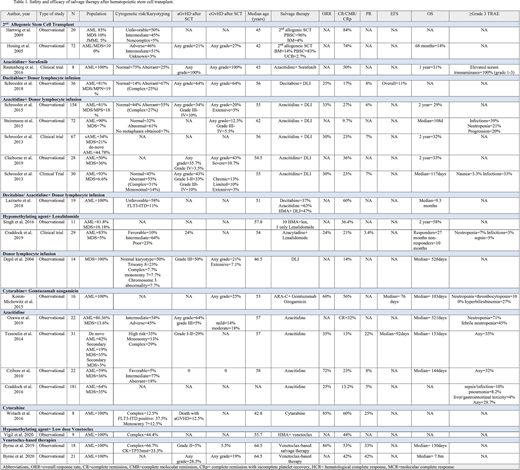Background:
Allogeneic Stem cell transplant (Allo-SCT) is a widely used treatment for multiple hematological malignancies, including acute myeloid leukemia (AML) and myelodysplastic syndrome (MDS). Relapse after Allo-SCT depends on the disease status prior to SCT, intensity of conditioning regimen and donor type. Disease relapse after SCT tends to have a poor prognosis with low probability of long term remission. This systematic review aims to assess the efficacy and safety of salvage therapies for disease relapse after first Allo-SCT.
Methods:
A search was performed on PubMed, Cochrane, Embase, and Web of Science. We used the following mesh terms and Entree terms, "salvage therapy" AND "stem cell transplant" AND "acute myeloid leukemia" OR "myelodysplastic syndrome" from the inception of data till 06/20/2020. We screened 1,666 articles and included 4 clinical trials (N=134) and 18 observational studies (N=756) in this systematic review. We excluded case reports, case series, preclinical trials, review articles, meta-analysis and original studies not providing efficacy and safety of salvage therapy in AML/MDS patients relapsed after Allo-SCT.
Results:
Among 22 studies (N=888), the age range was 14-75 years (Table 1). In two observational studies (N=92) where second Allo-SCT was used as salvage therapy, complete response (CR) was seen in 74-84% of the patients. Stable CR was achieved in 15% of the participants, and 44% experienced disease relapse. Overall survival (OS) at 68 months was 14%.
In the trial (N=8) evaluating, azacitidine in combination with sorafenib, CR rate was 50%, and 1-year OS was 31%. Hepatotoxicity was seen in these patients, none of the patients died or discontinued treatment due to treatment-related adverse events (TRAEs).
Azacitidine monotherapy was associated with a CR rate of 13-32% (N=256). Overall response (ORR) of 15% and 56% was seen patients with hematological and molecular relapse, respectively. ≥Grade 3 TRAEs were infections, pneumonia, sepsis and hematological adverse events. Donor lymphocyte infusion (DLI) monotherapy (N=14) showed CR in 14% of the patients with a 2 yr OS of 42%.
Decitabine in combination with DLI (N=36) led to CR in 17% of the patients with a median duration of response of 10 months. The incidence of acute and chronic graft vs. host disease (GvHD) was 19% and 5%, respectively. Similarly, azacitidine in combination with DLI (N=351) led to CR in 9.7-36% of the patients, with a 2-yr OS of 29-35%. In a retrospective study by Claiborne et al., 71% of patients experienced disease relapse at a median follow up of 6 months. Infections, neutropenia, and non-severe GI symptoms were attributed to azacytidine with DLI therapy. In a study on hypomethylating agents with lenalidomide (N=40), CR was seen in 21-36.4% of the patients, and 2-yr OS was 58%. Infections and neutropenia were reported in these patients.
In 3 observational studies (N=48), venetoclax based regimens were associated with CR in 42-53% of the patients and 43% maintained the response for ≥3 months. More than 60% of patients died of infections in one of these studies.
Conclusion:
Azacytidine, decitabine, sorafenib, venetoclax, lenalidomide and DLI were well tolerated by patients with disease relapse after Allo-SCT. Hypomethylating agents (azacytidine and decitabine) were more effective in combination with DLI, lenalidomide and venetoclax rather than monotherapy. Among drug therapies, best efficacy outcomes were reported in studies on venetoclax based regimens. Additional multicenter randomized, double clinical trials are needed to confirm these results.
Anwer:Incyte, Seattle Genetics, Acetylon Pharmaceuticals, AbbVie Pharma, Astellas Pharma, Celegene, Millennium Pharmaceuticals.: Honoraria, Research Funding, Speakers Bureau.
Author notes
Asterisk with author names denotes non-ASH members.


This feature is available to Subscribers Only
Sign In or Create an Account Close Modal